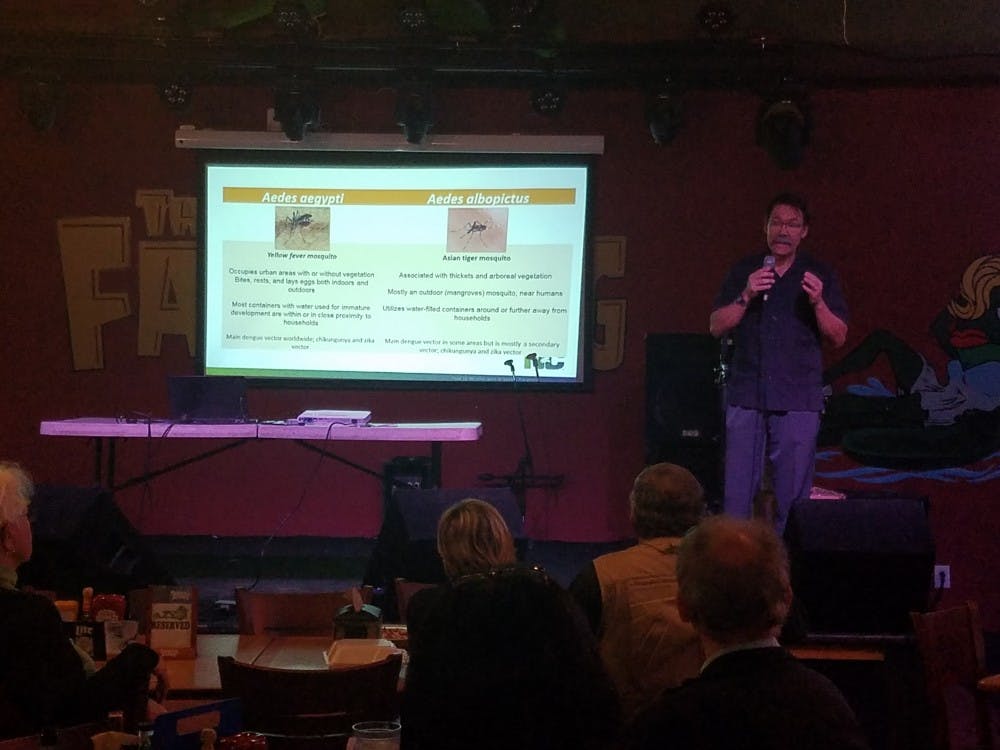NC Department of Health and Human Services representative Mike Doyle presented his research findings about the Zika virus at the Tectonic Plates: Alamance County's Science Cafe at 7:00 p.m. tonight at the Fat Frogg Bar and Grill.
A former Executive Director of the Florida Keys Mosquito Control District, he spent the last 12 years researching new methods of containment designed to address the threat posed by the Zika virus, including new forms of genetic modification and pesticide.

Doyle began his presentation with a set of statistics intended to quantitatively explain risks of infection the mosquitoes pose to the public.
"2.5 billion people in the world are at risk of contracting Dengue fever alone," Doyle warned. He later went on to say that 725,000 people die annually from mosquito-borne illnesses.
The discovery of the Zika virus in Miami and South Florida surprised the scientific community, who formerly classified it as a low threat to society.
Doyle assured the crowd that only certain breeds of mosquitoes can carry the virus. Two common breeds inhabiting South Florida are Aedes aegypti and the Aedes albopictus, or Asian tiger mosquito. The Asian tiger mosquito is categorized as a nuisance mosquito, or one that persistently bites humans but poses no immediate health threats. The Aedes aegypti is a container-breeding mosquito, aptly named for their tendency to breed inside of buckets, vases, hoses and so on.

The Aedes aegypti is also the most likely to infect someone with the virus, and the hardest to control.
Contraction and transmission of the virus can occur without any immediate awareness and lasts for up to 6-8 months. It may also spread to infants still in the womb.
If an uninfected mosquito pierces the skin of an infected human, the mosquito will contract the virus and can spread it to anyone else it stings. An infected traveler might fly home and be stung by a local mosquito, who then has the potential to start a chain reaction of infections within that area.
The mosquitoes generally hide and breed in areas unbeknownst to the local populations due to their reclusive nature. "Small puddles in corrugated drains, an empty beer can on campus, an under-maintained lake, these are all places where mosquitoes reproduce and spread outwardly," Doyle said.
His teams control the virus by using traps designed to attract and kill nearby mosquitoes and their eggs. They also disperse genetically modified versions of male mosquitoes--once they have offspring, a gene kicks in and starts producing huge amounts of protein that eventually kill the larvae.
Doyle is currently surveying NC county governments to gauge their efforts to control the virus and uncover results showing proactive pushes to remedy the local populations. He also hopes to continue experimenting with new solutions to address the spreading of the virus in North Carolina.
Dave Gammon, the organizer for the monthly Science Cafe presentations and an associate professor of biology at Elon University, thought that the speech was "enlightening" for a general audience to take in and did not feature any technical jargon that wasn't thoroughly explained.
"My main takeaway from the discussion was that the specific mosquitoes that cause Zika are so local. The nuisance mosquitoes will fly from miles and miles away, whereas the Zika virus mosquitoes ... will only go within a radius of a few blocks" Gammon said.
Doyle's speech captivated the minds of the small and educated audience, attracting many former academics and some students, a target audience Gammon aims for when he plans these events.
To learn more about upcoming Science Cafe presentations, visit their Facebook page at www.facebook.com/TectonicPlatesScienceCafe or contact Dave Gammon directly at dgammon@elon.edu.


